Anthony Bourdain’s name is synonymous with food, travel, and profound storytelling. His path to fame as a world-renowned chef, writer, and television host was anything but typical. Bourdain’s life unfolded through a series of transformative moments, struggles, and triumphs, leaving an indelible mark on both the culinary world and popular culture. His ability to blend food with human connection, history, and culture reshaped how we think about the world of food media.

Bourdain was a 1978 graduate of the Culinary Institute of America and a veteran of many professional kitchens during his career, which included several years spent as an executive chef at Brasserie Les Halles in Manhattan. In the late 1990s Bourdain wrote an essay about the ugly secrets of a Manhattan restaurant, but he was having difficulty getting it published. According to the New York Times, his mother Gladys—then an editor and writer at the paper—handed her son’s essay to friend and fellow editor Esther B. Fein, the wife of David Remnick, editor of the magazine The New Yorker. Remnick ran Bourdain’s essay in the magazine, kickstarting Bourdain’s career and legitimizing the point-blank tone that would become his trademark. The success of the article was followed just a year later by the publication of a New York Times best-selling book, Kitchen Confidential: Adventures in the Culinary Underbelly (2000). Bourdain became a media darling almost overnight. His first food and world-travel television show A Cook’s Tour ran for 35 episodes on the Food Network in 2002 and 2003. In 2005, he began hosting the Travel Channel’s culinary and cultural adventure programs Anthony Bourdain: No Reservations (2005–2012) and The Layover (2011–2013). In 2013, he began a three-season run as a judge on The Taste and consequently switched his travelogue programming to CNN to host Anthony Bourdain: Parts Unknown. I have seen many of those “parts” and still they are fresh and relevant.

Although best known for his culinary writings and television presentations, along with several books on food and cooking and travel adventures, Bourdain also wrote both fiction and historical nonfiction. On June 8, 2018, Bourdain died while on location in France, filming for Parts Unknown, of suicide by hanging.

Early Life and Influences.
Born on June 25, 1956, in New York City, Anthony Michael Bourdain grew up in a middle-class family in Leonia, New Jersey. His father was Catholic of French descent and his mother was Jewish. Bourdain stated that, although he was considered Jewish by halacha’s definition, “I’ve never been in a synagogue. I don’t believe in a higher power. But that doesn’t make me any less Jewish, I don’t think”. His family was not religious. His parents were not particularly involved in the food world, but their love for good food would influence Bourdain’s future career. Early on, Bourdain expressed a fascination with the culinary world, a passion he partially attributed to a family trip to France when he was 10 years old. This trip sparked a love of French cuisine that would remain with him throughout his life.Despite showing an early interest in food, Bourdain’s academic journey was not straightforward. He attended Vassar College for a brief period before shifting to the Culinary Institute of America (CIA) in Hyde Park, New York. Can you imagine Anthony presenting himself to the restaurant owner : “Hi, I’m from CIA”? Hilarious! Bourdain’s time at the CIA marked the beginning of his serious commitment to the culinary arts. He immersed himself in the discipline of cooking, eventually taking on jobs in some of New York City’s most prestigious restaurants.
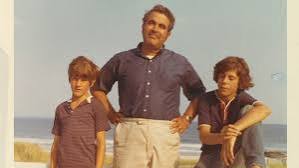
A Career as a Chef.
Bourdain’s rise through the culinary ranks was both challenging and unconventional. He began working in kitchens in the 1970s, experiencing firsthand the gritty, often chaotic nature of restaurant life. His career spanned many prestigious kitchens, including those at renowned establishments like Brasserie Les Halles in Manhattan, where he eventually became the executive chef. His time in kitchens exposed him to the high-pressure world of professional cooking, where perfectionism and creativity often collided. Throughout his career, Bourdain was known for his raw, no-nonsense approach to cooking and his straightforward attitude towards food. His culinary expertise and innovative approach to French-inspired cuisine quickly earned him respect among his peers. However, Bourdain’s career in the kitchen was not without its darker moments. Struggles with drug and alcohol addiction affected his personal life and professional trajectory. These battles would later become an important part of his personal narrative, which he would openly share in his writing.
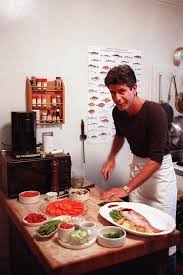
Breakthrough with “Kitchen Confidential”.
Anthony Bourdain’s real breakthrough came in 2000, with the publication of his memoir “Kitchen Confidential: Adventures in the Culinary Underbelly”. In this candid and brutally honest book, Bourdain pulled back the curtain on the often-seedy world of professional kitchens, exposing the harsh realities of restaurant life that had previously remained hidden from the public. With sharp wit, vivid anecdotes, and a sense of humor, Bourdain revealed the intense pressures of the kitchen, the dysfunction, and the underworld of drugs, sex, and violence that often accompanied the culinary lifestyle. “Kitchen Confidential” became an instant hit, resonating with both food lovers and general readers alike. Bourdain’s unique voice, filled with both raw honesty and dark humor, made the book a cultural phenomenon.
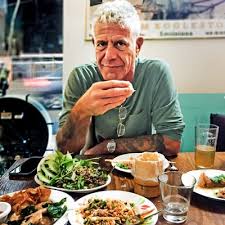
The memoir not only launched his literary career but also shifted public perceptions of professional chefs, who were once considered mere behind-the-scenes workers but now became celebrated figures in their own right.
Television Career, A Global Stage for Storytelling.
In the years following the success of “Kitchen Confidential”, Bourdain transitioned from writer to television host. His first foray into TV came in 2002 with “A Cook’s Tour” on the Food Network. However, it was his later shows that solidified his place as a beloved television personality. “No Reservations”, which premiered in 2005 on the Travel Channel, gave Bourdain a platform to travel the world and explore not just food but the culture, history, and people of each destination. The show was a critical success, winning numerous awards and earning Bourdain a global following.In 2013, Bourdain began hosting “Parts Unknown” on CNN, which continued his tradition of exploring food and culture across the globe.

What made Bourdain’s television shows unique was his ability to meld food with deeply personal storytelling. Rather than simply showcasing culinary dishes, Bourdain’s programs delved into the socio-political contexts of each location, often tackling sensitive topics such as war, poverty, and inequality. His approach to storytelling was not just about the destination but about connecting with the people he met along the way, making his shows resonate on a human level.Bourdain’s television work introduced audiences to a new way of experiencing the world. He was not a tourist in the traditional sense; instead, he embraced the local culture, often pushing past tourist attractions to immerse himself in the real lives of the people he met. His shows offered more than just a view of food—they were a window into the human experience, often through the lens of cuisine.

Personal life.
In the 1970s, while attending high school at Dwight-Englewood School, Bourdain dated Nancy Putkoski. He described her as “a bad girl”, older than he was and “part of a druggy crowd”. She was a year above him, and Bourdain graduated one year early in order to follow Putkoski to Vassar College since they had just started admitting men. He studied there between the ages of 17 and 19. He then attended the Culinary Institute of America, a 15-minute drive from Vassar. The couple married in 1985, and remained together for two decades, divorcing in 2005.
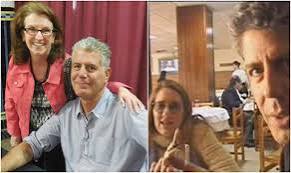
On April 20, 2007, he married Ottavia Busia, who later became a mixed martial artist. The couple’s daughter, Ariane, was born in 2007. Bourdain said having to be away from his family for 250 days a year working on his television shows put a strain on the relationship. Busia appeared in several episodes of No Reservations, notably the ones in Tuscany, Rome, Rio de Janeiro, Naples, and her birthplace of Sardinia. The couple separated in 2016.

Bourdain met Italian actress Asia Argento in 2016 while filming the Rome episode of Parts Unknown. In October 2017, Argento said in an article in The New Yorker that she had been sexually assaulted by Harvey Weinstein in the 1990s. After being criticized for her account in Italian media and politics, Argento moved to Germany to escape what she described as a culture of “victim blaming” in Italy. Argento delivered a speech on May 20, 2018, following the 2018 Cannes Film Festival, calling the festival Weinstein’s “hunting ground”, alleging that she was raped by Weinstein in Cannes when she was 21. She added, “And even tonight, sitting among you, there are those who still have to be held accountable for their conduct against women”. Bourdain supported her during that period.

On June 3, 2018, Bourdain tweeted a video where the team was celebrating during the production of the show with Argento as director, him and Chris Doyle.
Bourdain practiced the martial art Brazilian jiu-jitsu, earning a blue belt in August 2015. He won gold at the IBJJF New York Spring International Open Championship in 2016, in the Middleweight Master 5 (age 51 and older) division.

Bourdain was known to be a heavy smoker. In a nod to Bourdain’s two-pack-a-day cigarette habit, Thomas Keller once served him a 20-course tasting menu which included a mid-meal “coffee and cigarette”, a coffee custard infused with tobacco, with a foie gras mousse. Bourdain stopped smoking in 2007 for his daughter, but relapsed towards the end of his life.
A former user of cocaine and heroin, Bourdain wrote in Kitchen Confidential of his experience in a SoHo restaurant in 1981, where he and his friends were often high. Bourdain said drugs influenced his decisions, and that he would send a busboy to Alphabet City to obtain cannabis, methaqualone, cocaine, LSD, psilocybin mushrooms, secobarbital, tuinal, amphetamine, codeine, and heroin.
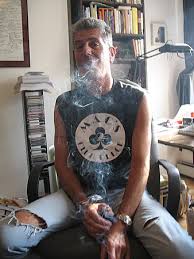
Cultural Influence and Legacy.
Bourdain’s influence extended far beyond the realm of food. He became a cultural ambassador, opening the door to a broader understanding of the world and its diverse people. His commitment to exploring global cuisine was grounded in a deep respect for local traditions and practices, but his shows also served as a platform for important social and political conversations. Bourdain’s advocacy for underrepresented communities, his willingness to challenge stereotypes, and his exploration of complex global issues elevated him from a chef to a respected figure in global cultural discourse. Perhaps one of his most significant contributions was in how he normalized the notion that food, travel, and culture are intrinsically linked to human stories. Through his work, he bridged cultural divides, encouraged empathy, and opened people’s eyes to the beauty and complexity of the world’s most remote and misunderstood places.

Personal Struggles and Tragic Death.
Despite his professional success, Bourdain’s life was not without its personal challenges. Throughout his career, he battled with addiction, depression, and anxiety, which he often discussed openly. His struggles with drugs and alcohol were part of his story, and they gave depth to his persona, showing the vulnerability behind the confident and brash chef. Bourdain was candid about these challenges in his writing and television appearances, often revealing the pain he felt beneath the public-facing persona of success.Tragically, on June 8, 2018, Anthony Bourdain passed away by suicide while filming an episode of “Parts Unknown” in France. His death shocked the world and prompted an outpouring of grief from fans, colleagues, and friends. In the wake of his passing, many reflected on the deeper emotional struggles that Bourdain had fought throughout his life, and the broader conversation about mental health and suicide became more urgent in both the entertainment industry and beyond.

Bourdain’s Legacy.
Anthony Bourdain’s legacy is multifaceted. He changed the way we view food, turning it from a simple commodity into a means of understanding culture and connection. His television shows, books, and interviews continue to inspire chefs, travelers, and storytellers worldwide. Through his work, Bourdain emphasized the importance of compassion, open-mindedness, and the importance of understanding and embracing cultural differences. In the years following his death, Bourdain’s impact remains ever-present. His memoirs continue to be read by new generations of food lovers and aspiring chefs, while his television shows still air on networks and streaming platforms, providing a glimpse into his uniquely empathetic worldview. Bourdain’s ability to share intimate moments of vulnerability, alongside his passion for food and culture, made him one of the most important figures in the modern media landscape.
Anthony Bourdain’s life was a testament to the power of storytelling, the transformative impact of travel, and the profound way in which food can bring us closer together. His ability to expose the beauty of the world’s diverse cultures while confronting the harsh realities of life made him an iconic figure. While his death was a tragic loss, his work continues to inspire people around the world to explore, learn, and connect with others through the universal language of food.

I wrote this article in the loving memory of my icon, thank you Anthony.

Pingback: The Endless Bowl: The Rich History, Culture, and Secrets of Ramen – World Today